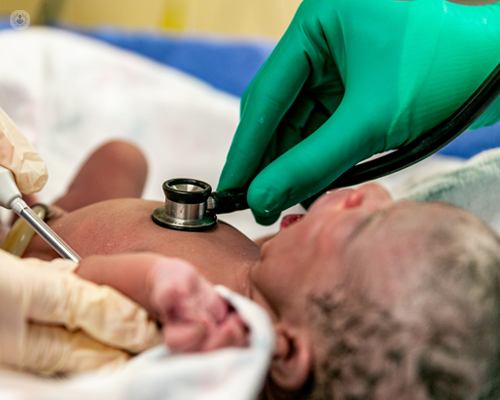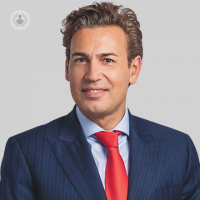Matters of the heart: Congenital heart disease
Written by:‘Congenital’ specifically refers to conditions present from birth. However, ‘heart disease’ can be a term that covers various illnesses relating to birth defects of the heart.
Here to provide an expert introduction to congenital heart disease is leading cardiologist, Dr Francesco Lo Monaco.

What is congenital heart disease?
It’s the term for a broad array of conditions that relate to birth heart defects. It’s used generally to describe things such as:
- aortic tears
- malformations
- underdeveloped anatomy
Congenital heart disease can be diagnosed right from birth or as a child. Also, diagnosis for some doesn’t happen until late in adulthood. Almost 1 in 100 babies born in the UK have congenital heart disease in some form.
Early diagnosis of congenital heart disease is better for patients. It can be a cause of sudden death in young people, particularly if it’s left untreated. It can be a more general term for conditions that include:
- When the heart gets very dilated and loses strength (dilated cardiomyopathy)
- When the heart becomes thicker (hypertrophic cardiomyopathy)
- Malignant arrhythmias
- Disease of the right ventricle which congenitally becomes dysplastic
- Holes in the interatrial and interventricular septum
What are the causes of congenital heart disease?
Due to the fact that congenital heart disease is so prevalent, there are no known specific causes. However, in regards to pre-existing conditions, there are many correlations. Children with Down’s syndrome are more likely to have congenital heart defects, particularly if the mother contracted viral infections during pregnancy, drank alcohol or used drugs for the pregnancies’ duration. Uncontrolled or poorly-controlled Type 1 or 2 diabetes in the mother may also contribute to the chance of the foetus developing congenital heart disease, in some cases.
Pre-birth tests as well as ultrasounds can sometimes diagnose these problems in the event of suspected congenital heart disease.
What are the symptoms of congenital heart disease?
The most common congenital heart disease symptoms are:
- irregular heartbeats (arrhythmia)
- swelling of the legs or abdomen (oedema)
- shortness of breath
- fatigue, tiredness and dizziness
- blueness in the skin, toes and lips (cyanosis)
- poor weight gain
These symptoms in children, in particular, can manifest when the baby is feeding or performing physical activity. It’s important to note this as the child grows, because it’s better to get a diagnosis as early as possible.
What is involved in the prevention and diagnosis of congenital heart disease?
Congenital heart defects occur sometimes because of internal factors, such as chromosomal deficiency, as stated previously. However, they often occur due to external factors. It’s recommended that pregnant mothers follow a prenatal regimen that includes taking vitamins and having routine checks with their GP, as well as stop drinking, smoking and reduce unhealthy eating. As soon as you learn you are pregnant, consult your doctor in order to make sure the medications you take don’t cause any complications.
Congenital heart disease diagnosis can take place during pregnancy via ultrasound or foetal echocardiogram tests. There’s a limit to the number of tests that can be performed to diagnose congenital heart disease in utero. It’s recommended to undertake these tests to ensure a diagnosis – and treatment - as early as possible.
A diagnosis can be made after birth during routine exams. For example, if an irregular heartbeat presents under a stethoscope, further testing may be requested. This includes:
- ECGs
- MRIs
- X-rays
- Echocardiogram tests
What is involved in the treatment for congenital heart disease?
More treatment options are available the sooner diagnosis is made. Some types of congenital heart disease may not need any treatment, such as small blockages or holes. Others may need surgery, implants or other procedures.
Prescribed medications for congenital heart disease can range from blood-thinning medicine called aspiring, to beta-blockers. Sometimes a doctor will order further testing to plan a stent or graft insertion, and it can transpire that the treatment is as simple as regular visits to the doctor and mandated exercise. If the diagnosis is more severe, however, exercise may be alternatively discouraged altogether.
It’s ultimately important to follow your doctor instructions, including regular visits and tests. It’s possible to request a test from your doctor, in the form of blood testing, pre-screening or an echocardiogram test, if you suspect a congenital heart defect in yourself, your child or want to ensure your unborn child is healthy.
Arrange testing for congenital heart defects with Dr Lo Monaco, or other cardiology concerns you may have, via his Top Doctors profile.


